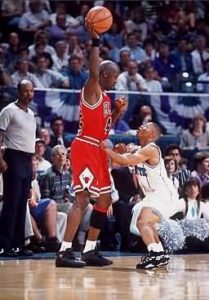You Can’t Coach Tall
 Basketball coaches have a saying: You can’t coach tall. They know the difference between a talent which is an accident of birth and a skill that can be coached, taught and learned,
Basketball coaches have a saying: You can’t coach tall. They know the difference between a talent which is an accident of birth and a skill that can be coached, taught and learned,
Clearly, the self-described Evil HR Lady (aka Suzanne Lucas) does not. In her April 2019 blog and subject of a TED talk she observes:
“When we use the word “talent” to refer to employees, what we’re implying is you need to have the knowledge, skills and abilities to do the job perfectly from day one.”
Simply, talent is not synonymous with knowledge, skills or abilities. Knowledge can be acquired. Skills can be learned. Abilities can be considered the combination of talents and skills.
Further, there is no implication that a talented employee can “do the job perfectly day one.” Just as a talented basketball player needs to learn the skills of the game, so does a talented new employee in any position.
Basketball coaches know if a short player masters the skills of the game like passing, shooting, dribbling and playing defense the end result is still a short basketball player. A tall defender can easily block her shots and on offense simply turn and shoot over a shorter defender. You can’t coach tall.
This is not a new area for intellectual debate. Psychologists have wrestled with the question of how culture affects intelligence test scores since the inception of the Stanford Binet the early 1900s. There is still an ongoing quest for the prefect culture free non-language test for native intelligence.
The discussion has continued with the first cousin of intelligence: aptitudes. Prominent in news covering the college admissions scandal, SAT once stood for Scholastic Aptitude Test. A central purpose of the SAT was to guide college admissions officers in controlling for gpa and class rank differences across secondary schools. Both can vary widely by school. For example, class rank from a selective prep school cannot be weighed the same in admissions decisions as class rank from a less fortunate public school. The SAT offered to help balance out the inequalities of class rank by assessing innate scholastic aptitude.
Critics of the SAT argued that if it was truly measuring an aptitude, then its scores could not be coached. However, the evidence clearly shows that SAT courses like Kaplan’s can improve SAT scores. In fact, Kaplan offers to return your money if SAT scores don’t improve. Of course, if you are a wealthy celebrity you can just hire someone to take the test for your kid.
Yielding to the evidence SAT scores can be improved through coaching, the publisher changed the name to Scholastic Assessment Test in 1994. Since assessment and test can be used interchangeably, the College Board might as well called it the Standardized Test Test or the Scholastic Assessment Assessment.
The real hazard in the writings of the Evil HR Lady is not her ignorance of key terms like talent, knowledge and abilities. It is her advice to select candidates for jobs based on what should be termed skills and not talents. If your desire is to assemble the equivalent of short, slow-footed basketball players, take her advice.
If, however, you want to assemble a high performing team follow my advice from Rainmakers, Closers & Other Sales Myths (Rowman & Littlefield, 2007) and recruit for talent and train for skills.

Brusque yet accurate, Arnie.
Where was Lori Laughlin when I needed her in 1980 🙂
She may have helped. Her defense is that she did not think of the money as bribes but as charitable donations. https://www.mercurynews.com/2019/06/05/the-charity-not-bribes-defense-of-lori-loughlin-bay-area-parents-is-weak-former-federal-prosecutor-says/